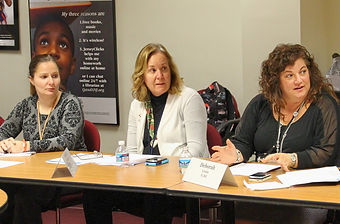About The New Jersey Cultural Alliance for Response:
Working closely with New Jersey Office of Emergency Management (NJOEM), NJCAR has incorporated the State's cultural resources into the statewide Emergency Response Framework for disaster planning, risk assessment, hazard mitigation, and recovery. As a result, county and local government emergency managers can connect through NJOEM and NJCAR with managers of cultural assest in their local communities.
Purpose and Function
NJCAR’s primary aims are to prevent and mitigate the loss of cultural and historic resources in the event of a disaster and to serve as a statewide resource.
The functions and duties of NJCAR are to engage in the following activities:
Conduct regular steering committee meetings to address pertinent issues regarding emergency preparedness and response.
-
Hold regular meetings for the membership to provide the opportunity for networking and education and plan future events and programs.
-
Maintain a database of members with current contact information and a detailed list of experts and services related to emergency response for collections, facilities, and other needs.
-
Provide, promote and facilitate information exchanges, training, exercises, and educational opportunities related to emergency preparedness and response for cultural and historic resources.
-
Provide remote and onsite (if possible) assistance to natural, cultural and historical organizations or history, cultural and creative professionals who experience an emergency or disaster.
-
Partner with other organizations and communities that have similar interests.

Founding Members of NJCAR
Front Row: Vice Chair – Karl Niederer (NJ Historic Preservation Office), Chair – Michele Stricker (NJ State Library), and Secretary – Joseph Klett (NJ State Archives)
Back Row: Dan Saunders (NJ Historic Preservation Office), Judith Adams (NJ Historic Trust), Anthony Gardner (NJ State Museum), Argean Cook (NJ State Archives), Mark Texel (NJ DEP – State Park Services), Sara Cureton (NJ Historical Commission), Margaret O’Reilly (NJ State Museum), Kate Litvak (Crossroads of the American Revolution), Nick Paleologos (NJ Council on the Arts), Lauren Wiley (County Archives and Records Management Association), and Carol Cronheim (Assistant Secretary of State)

-
Conservation Center for Art and Historic Artifacts
-
County Archives and Records Management Association
-
FEMA (Liason)
-
Heritage Preservation
-
The League of Historical Societies of New Jersey
-
LYRASIS
-
Mid-Atlantic Regional Archives Conference (MARAC)
-
New Jersey Council on the Arts
-
New Jersey Department of Environmental Protection - State Parks Service
-
New Jersey Department of State
-
New Jersey Emergency Management Association
-
New Jersey Historic Preservation Office
-
New Jersey Historic Trust
-
New Jersey Historical Commission
-
New Jersey Library Association
-
New Jersey Office of Programs
-
New Jersey State Archives
-
New Jersey State Library
-
New Jersey State Museum
-
New Jersey State Police - Office of Emergency Management (NJOEM)

Deborah Costa of FEMA offers suggestions about partnering with emergency management. She is joined by Erin Leswing-Makowski and Jennifer Dilorenzo.

Laura Connelley (far left) of the NJ State Police lead a tour of the NJ Regional Operations Intelligence Center for Michele Stricker, NJ State Library, Argean Cook, NJ State Archives, and Deborah Costa, FEMA.
History
In 2012, Regional Emergency Response Networks (RERN) project provided 10 weeks of training to prepare staff to handle anything from small in-house emergencies to knowing what to do in the event of a large-scale disaster. The training, taught by Tom Clareson, senior consultant for Digital & Preservation Services at LYRASIS, the nation’s largest library and cultural heritage network, took place in Atlantic and Cape May counties, and was funded by a National Endowment for the Humanities Preservation and Access grant.
The State Library took that training statewide with the first “Ports in a Storm” Summit in April 2013, bringing together emergency planning experts, librarians, first responders, public health workers, community and faith-based groups to build community partnerships and to provide a forum for discussing roles libraries and information professionals can play in supporting future disaster preparedness, response and recovery efforts.
Later that month, representatives from five of New Jersey’s state cultural agencies participated in Heritage Preservation’s first State Heritage Emergency Partnership forum, a two-day event that fostered a preparedness dialogue between state cultural agencies and their emergency management agency.
In addition, several groundbreaking meetings occurred with the NJ Office of Emergency Management (NJOEM), Federal Emergency Management Agency (FEMA), the NJ State Library, NJ State Museum, NJ State Arts Council, NJ State Archives, NJ Historical Commission and the State Office of Preservation, which led to the creation of the NJ Cultural Alliance for Response.
The collaboration created a firm bond between all the agencies, resulting in the creation of a Statewide Preparedness Network, a tour of the NJ State Police Regional Operations and Intelligence Center, Trenton, and meetings at the FEMA Sandy Recovery Office and the State Library. Future plans include regional workshops in disaster planning, an Incident Command System, social media for disaster response and hands-on disaster recovery training for cultural materials.
Founding Organizations and Liasons

